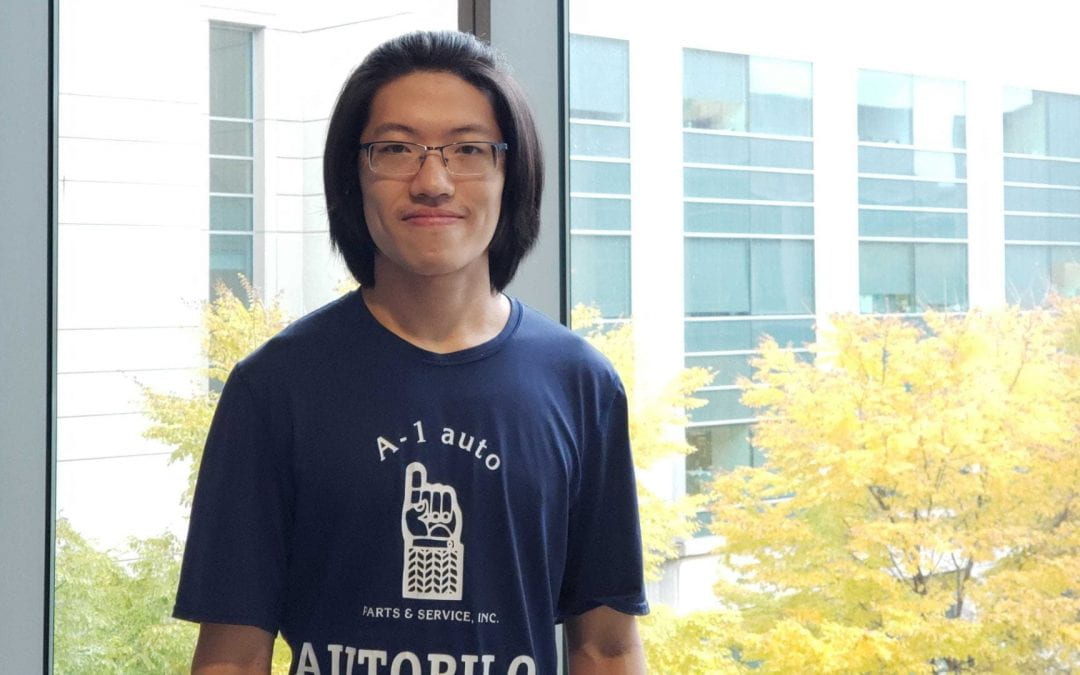Charles Tiancheng Wang, a third-year Chemistry student at Northwestern, was awarded the 2020 Lambert Fellowship, the Chemistry of Life Processes Institute’s (CLP) most prestigious undergraduate award. The Fellowship was endowed in 2016 by Andrew Chan, MD, PhD (Weinberg), CLP Executive Advisory Board Chairman, and Vice President of Research Biology at Genentech. It honors the work of Chan’s advisor in the late 1970’s at Northwestern, Joseph B. Lambert, PhD, who had a profound impact on Chan’s educational experience.
An extraordinary teacher also influenced Wang’s academic interests and success.
“My high school teacher sparked my interest in chemistry beyond what was taught in the classroom,” says Wang. “He talked about the intrigue and complexity of chemistry and encouraged me to enroll in an accelerated chemistry program on Saturdays.” His teacher also introduced Wang to the work of Northwestern’s Fraser Stoddart, PhD, who won the 2016 Nobel Prize in Chemistry.
“Back then, being from Singapore across the Pacific, I wasn’t familiar with Northwestern. It was more about finding out what you could do with molecules and making beautiful machines with them— molecular dynamics applied to the highest level in the real world.”
When it came time to choose a college, Wang ultimately decided on Northwestern for its world-renown Chemistry Department and the opportunity to learn from leaders in the field like CLP member Karl Scheidt, Professor of Chemistry (Weinberg) and Pharmacology (Feinberg).
“Professor Scheidt does drug design as well as organic chemistry synthesis and methodology,” says Wang, who joined Scheidt’s group last summer. “I was always interested in the intersection between these fields. Organic chemistry is more of a basic science, whereas drug design translates that science into applications.”
Wang is working with the lab’s team members to develop a new carbon functionalization technique that will be used to create different functional capabilities on organic molecules.
“In organic chemistry, the most common type of bond is the carbon hydrogen bond. What’s so challenging about this bond is that it’s very stable, which makes it very difficult to get this bond to selectively react and get replaced by a different bond, say from a carbon hydrogen into a carbon oxygen,” says Wang. If he succeeds, the new subsequent bonds could be used to new therapeutics or industrial compounds.
Scheidt encouraged Wang to apply for CLP’s Lambert Fellowship and enthusiastically supported his application.
“Charlie was the top student in my CHEM212-2 class last year as a freshman and has continued his stellar educational trajectory,” says Scheidt. “He has already shown great aptitude and drive in the laboratory and is listed as a co-author on an upcoming publication, in which he synthesized 20 natural product-inspired small molecule compounds that were evaluated as agonists of the serotonin-2C receptor. The CLP Lambert Fellowship is a tremendous opportunity and appropriate recognition of Charlie’s potential as a promising young scientist.”
Lambert Fellows work on a research project over a period of two years under the guidance of a CLP faculty member and graduate student or postdoctoral mentor from the faculty member’s lab. They receive a stipend to work full-time on their projects during summer quarters, an allowance for lab supplies, and funding to participate in scientific conferences and online workshops.
“I really look forward to meeting the other Lambert Fellows and making the most of my time for research,” says Wang.
